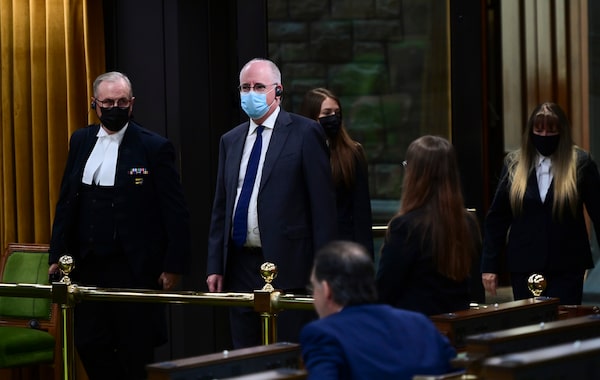
President of the Public Health Agency of Canada Iain Stewart, second from left, approaches the bar in the House of Commons to be admonished by the Speaker of the House of Commons Anthony Rota on Parliament Hill in Ottawa.Sean Kilpatrick/The Canadian Press
That was quite a scene on the floor of the House of Commons the other day: The president of the Public Health Agency of Canada, Iain Stewart, “summoned to the bar” of the House (yes, it’s an actual brass bar) to be admonished by the Speaker for his refusal to hand over documents the Commons had demanded.
You could forget, amid all the comic stage business of MPs shaking their jowls at one another, that some deadly serious issues are at stake. The documents in question have to do with the mysterious removal, and later firing, of two federal scientists from a top-security infectious disease laboratory in Winnipeg, possibly connected to the shipment of lethal viruses to China’s Wuhan Institute of Virology. Yes, that Wuhan.
More to the point, it is Parliament’s undoubted right to send for any “persons, papers and things” it chooses in the prosecution of its oversight role. The right is absolute and without limit, as Speakers up to and including the current one have ruled, except for such limits as Parliament itself agrees to. If governments may refuse to provide Parliament with the documents it requires, then they cease in that respect to be accountable to Parliament, as they have long since ceased to be accountable to it in other ways.
Which suggests the wrong person was summoned to the bar. Mr. Stewart may not, as he maintains, have been acting on the Prime Minister’s instructions. But there is no doubt he is acting with the Prime Minister’s approval. The Prime Minister could order the documents’ release at any moment, and Mr. Stewart would have no choice but to comply, or resign his post. That he has not had to do either is because the Prime Minister is no more inclined to comply with Parliament’s orders than he is.
Parliamentarians have undermined their own security and intelligence committee
Top public-health official defies Parliament and refuses to release documents on fired scientists
That, let us be clear, is the issue here. The government may be correct that the documents contain “extremely sensitive” material that could compromise Canada’s national security – though the parliamentary motion demanding their release was careful to stipulate they would first be redacted by the Commons law clerk, who would then share the excised material in confidence with members of the Commons committee on Canada-China relations.
The government may equally be on solid ground in proposing that the documents be sent instead to the National Security and Intelligence Committee of Parliamentarians (NSICOP) – though the Opposition are surely right to object that this is not a committee of Parliament, but rather operates under the Prime Minister’s authority, and subject to his, rather than Parliament’s, prerogatives.
But – a point the government does not seem to get – it is not up to the government to decide these things. It would not matter how sound the government’s objections were in refusing access to the documents, or how frivolous Parliament’s reasons for demanding them. The rule is, Parliament decides what Parliament needs to see. The government’s role is limited to providing it.
That’s not only a matter of what the law is. It is how it should be. If governments could decide for themselves what Parliament, and through it the public, may know, then that is all that Parliament or the public would know: what it pleased the government to tell them.
Perhaps the government is telling the truth when it says the disclosure of the documents, even to parliamentarians, would jeopardize human intelligence sources, or damage Canada’s credibility with other countries as “a responsible security partner.” Or perhaps it is simply worried they would make it look bad. That is obviously not a matter that can be left to the government to adjudicate – though it seems it is not obvious to this government.
This is not the first time, after all, it has taken it upon itself to decide what Parliament may or may not see or hear. In recent months it has refused to let witnesses appear before committees of Parliament looking into the WE Charity scandal and the Jonathan Vance affair. As it happens, the issue before the committees in either case was whether the Prime Minister’s Office was involved. Before that there was the extended stonewalling in the matter of the Prime Minister’s interference in the prosecution of SNC-Lavalin. One begins to sense a pattern.
It does not seem that it should be too difficult to craft a compromise that would allow MPs to see the documents under conditions that would address any legitimate national security concerns. That both government and Opposition seem instead to prefer to escalate the confrontation may be put down to pre-election politics.
But that does not alter the basic principle involved. It is Parliament’s right to see whatever documents it wants. And it is the government’s duty to provide them.
Keep your Opinions sharp and informed. Get the Opinion newsletter. Sign up today.
 Andrew Coyne
Andrew Coyne